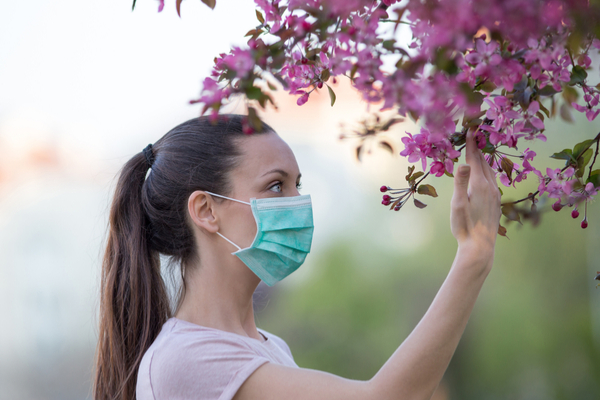The American College of Allergy, Asthma, and Immunology points out that allergies in general occur when your immune system overreacts to something that is typically harmless in others. For seasonal allergy sufferers, that means their bodies don’t react well to allergens like pollen, grass, and/or ragweed. The symptoms that often accompany allergies include:
- Runny nose, stuffy nose, and/or sneezing
- Wheezing or shortness of breath
- Dry Cough
- Rashes
- Fatigue
- Headache
In addition to those symptoms, Marc F. Goldstein, MD, chief of allergy and immunology at Pennsylvania Hospital and medical adviser at Curist, explains that those with seasonal allergies may also experience itchy, watery, or puffy eyes; and an itchy nose, throat, and ears. He also notes that people with asthma may have an exacerbation of their symptoms, as well.
As far as the symptoms of COVID-19 goes, the Centers for Disease Control and Prevention (CDC) says those with the virus show three main symptoms:
- Fever
- Shortness of Breath
- Dry Cough
Some less common coronavirus symptoms include: aches and pains, nasal congestion, runny nose, sore throat or diarrhea, per the World Health Organization (WHO).
The main difference that stands out between coronavirus symptoms and those of seasonal allergies? Coronavirus can cause a fever; allergies cannot. “With COVID-19 respiratory illness people typically have fever with coughing and shortness of breath, so fever is a big distinction,” he says. Another major distinction is that allergies will also come with some level of itchiness, while coronavirus will not. And while sneezing can occur in both conditions, those with allergies often suffer more from nasal issues. “With allergies, people often have bouts of sneezing where you just can’t stop. People with coronavirus are showing less of that incessant sneeze so it’s more infrequent,” Dr. Goldstein says.
The differences between the two can also be subtle, and may even take some investigative work, like checking your town’s pollen count. “If you live in an area where the spring pollen has not yet picked up, it’s unlikely that the symptoms are from seasonal allergies,” Dr. Goldstein suggests, that’s because “coronavirus symptoms are independent of pollen count.”
One of the most important distinctions (if not the most important) between the two conditions is that coronavirus is extremely contagious, while seasonal allergies are not. “People who think they may have been exposed or are exhibiting coronavirus-type symptoms should be tested and quarantined to prevent further spread. Coronavirus patients do require hospitalization in some cases,” says Dr. Goldstein.
Dr. Goldstein also notes that allergy sufferers are all too familiar with their symptoms: “They come to expect the pattern of how symptoms flow from allergies to their chest,” he says. “Someone with coronavirus would have a different pattern and the cough or sneeze may even feel different.”
That being said, this allergy season, Dr. Goldstein encourages allergy sufferers to be socially aware of the consequences their symptoms may have on those around them. “Because of the overlap of some symptoms between allergies and coronavirus, allergy sufferers now have the risk of provoking or scaring the people around them unnecessarily,” he explains. “As a result, allergy treatment is even more important this spring—not just for symptom relief for allergy sufferers themselves, but also for those around them!”
—
Photo Credit:Budimir Jevtic / Shutterstock.com
